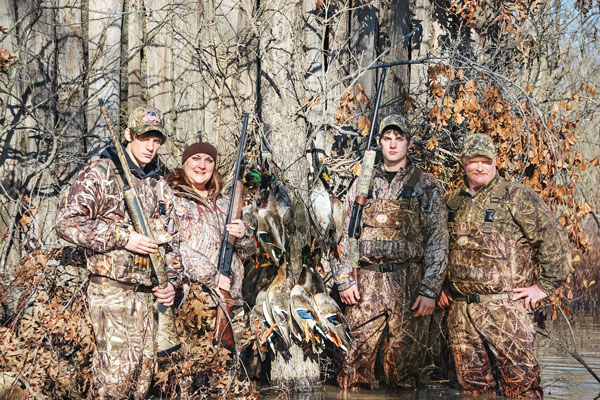January 14, 2015
By Skip Knowles
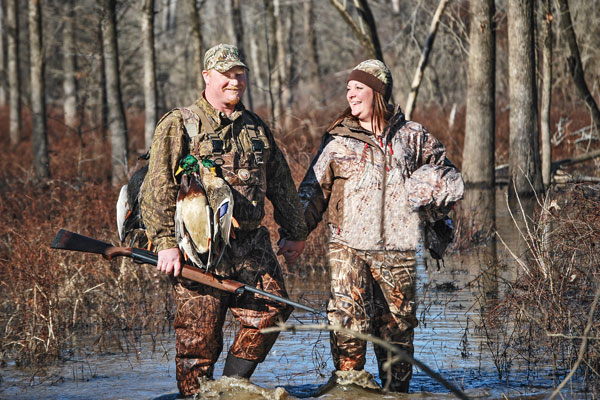 So you have a great idea for some duck-killing shotshells. How do you hit a home run and start a unique ammo company around the concept? One that will grow and become a gladiator in that arena? It's easy, as long as you can first round up a rocket scientist, an accountant, a genius and a millwright€¦and it helps if the last two are the same guy.
So you have a great idea for some duck-killing shotshells. How do you hit a home run and start a unique ammo company around the concept? One that will grow and become a gladiator in that arena? It's easy, as long as you can first round up a rocket scientist, an accountant, a genius and a millwright€¦and it helps if the last two are the same guy.
Hevi-Shot's tungsten-iron bird shot had no equal when it premiered back in 1999, and 15 years later it still doesn't. Other heavier-than-lead offerings came and went at some point from most of the major ammo manufacturers, but the first is now the last standing. It is a rare product that can continue to make the claim of having no equal, and now they have no competition, either. Yet the people behind Environ-Metal will tell you right away the good and the bad of their products, which gets back to their open corporate culture of listening to customers.
Kelly Sorensen puts it best, "we like to win, but we're just pretty casual about it."
And winning they are. We've always thought of Environ-Metal — both the company and the products — as waterfowling's specialized hevi-weights, but they are quickly fulfilling Sorensen's goal of becoming a full-sized ammunition company, not just a niche company.
Advertisement
With new lead shotshells and steel waterfowl loads selling like wildfire, and the huge success of Hevi-Shot, Hevi-Metal, and Speed Ball as well as turkey, coyote, and now hog hunting shells, Environ-Metal has increased factory space 50 percent and doubled production to continue growing at an amazing rate, adding a 130-store chain in Canada this year.
And original Hevi-Shot is so lethal it continues to change the way we hunt, for those willing to spend the money. For instance, it is turning legions of aging turkey hunters into 20-gauge fans because they can stone birds at 40 yards all day with a lighter, more pleasant gun to carry in the woods, one that is also easier to hold up as a bird takes its time approaching. But while Hevi-Shot now has no official competition, Kelly openly admits it has one big problem.
"I go to tons of shows and listen to what people tell me, and it's a fact, original Hevi-Shot is simply too expensive unless you are going on the trip of a lifetime. I'm just not that mad at the ducks," she says.
Advertisement
But that shortcoming — expense — has spurred more innovation, something at which Environ-Metal excels. Hevi-Metal, the tungsten and steel shot mix, works phenomenally well and runs about a dollar a shell, an alternative to Hevi-Shot that is still a class above steel, so there's a whole new market conquered. Kelly is the face of the company, the one who keeps her finger on the pulse of market demands.
As vice president of sales and marketing, the former accountant is the one soliciting feedback and meeting customers and vendors at events. That feedback leads to product lines aimed at strong demands, not simply thrown out there hoping to create one.
Why such innovative success? The answer is simple. Environ-Metal is no longer tiny, but still small enough to be responsive. "We move fast. If I see a customer need, we talk it through, come up with solutions, make decisions and just go do it," she says.
Kelly has a direct hotline to the master mind behind products like Speed Ball — she's married to him. It's a case study in how small, flexible, companies can be so much more responsive to the market and succeed where lumbering giants with vast R&D departments struggle. Kelly and Mike, (owner of Sorensen, Inc., which is contracted by Hevi-Shot), were neighbors and later worked at a titanium foundry together, then Environ-Metal.
"I pretty much had a 20-year crush on him and he finally gave in. He is a genius and probably the kindest, most gentle and smartest person on earth, and he will be the last one to ever tell you that. He thinks of things in the craziest way, in some kind of third dimension. He custom designed our house and it has no interior weight-bearing walls, you can just push the walls out."
Mike loves the freedom Environ-Metal allows him. "We are a small company so we don't have people saying you can't do this and you can't do that. We just try something if it seems cool. Most of us here didn't have a lot of shotshell experience to start with so we just went and did what we thought we should and tried stuff."
Kelly is the people-person, who loves the feedback, "the stories about people getting their first double," and promoting products that can help folks have a better time out in the field. Then she takes that input to Mike to create concepts. "That's our advantage over some of the other companies that have to get so many OKs from different departments just to do anything. We don't."
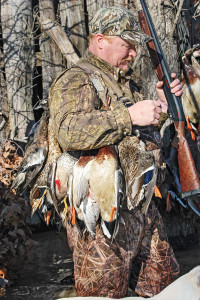 And unlike much of the shooting industry, they don't stop innovating as soon as orders pour in. "We are trying to add something new every year to keep us on the cutting edge," Mike says, then chuckles. "Every year we say 'next year we just need to catch our breath.' We are always hoping to take a break, but then somebody says 'you know we really need something here.'"
And unlike much of the shooting industry, they don't stop innovating as soon as orders pour in. "We are trying to add something new every year to keep us on the cutting edge," Mike says, then chuckles. "Every year we say 'next year we just need to catch our breath.' We are always hoping to take a break, but then somebody says 'you know we really need something here.'"
Kelly grew up in Lincoln, Ill., in the '70s€¦and didn't have a chance to not be a tomboy, since she was born last of six girls. "My dad said, 'I'm just going to make this one my boy,' and I've been fishing and hunting ever since I was knee-high," Kelly says. "It was always more fun to me to play with BB guns and climb trees. Granddad was a huge waterfowler, and I was just the one that they took everywhere." That passion for the outdoors runs deep. "I love to hunt, though I'm just as happy if I don't get anything."
After losing her dad a few years back, she is super-motivated to do as much as possible. All her kids hunt, too, (two girls and twin boys ages 19 to 25). Now she's a grandma, trying to teach her granddaughter to blow a duck call€¦when she's not gunning down hogs from a helicopter testing their new Hog Wild shotshells.
"That's the most exciting thing I've ever done. Man, when you hit them with that stuff€¦I've never seen anything drop like that. I like diamond earrings and having my nails done, but I still like to go out and hunt and kill stuff," she says. Home is the Williamette Valley of Oregon, outdoors heaven. She really "got religion" in waterfowl terms down south, however, when she experienced a good flooded timber hunt two years ago. "I should never have done that. Now that's all I want to do. There is something about the birds coming through those trees. Going back to a pit blind, it just wasn't the same," she said.
Her mind is never far from the next idea, though. Speed Ball is just the kind of innovation Mike dreams up. In this case using a cork ball to alleviate pressure problems that stood in the way of high-velocity gains. "Customers want rocket-launcher speed with 50 pounds of shot to kill a teal. The problem is when you get speed and large volume payloads you build barrel pressure and pass safe limits, and he solved that problem," Kelly says. "Speed Ball is the most consistent shell we sell. It patterns so well we thought something was wrong."
Recently, she made a long shot with it in the timber on a bird someone had wounded. "I stepped around the tree and it folded when I shot. I will be 100 years old in a nursing home and still be thinking about that shot."
Hevi-Steel
Despite their killer creations, Kelly knew the market was big for affordable steel and told CEO Ralph Nauman just that, promising "this is the amount we'll sell," before walking out of his office thinking "Oh Lord, I hope I can do that," she recalls with a nervous laugh. "We are now three times over that amount. It's a flat out home run. Hevi-Metal keeps growing every year, too, and I keep thinking 'there are only so many waterfowlers' but it keeps growing."
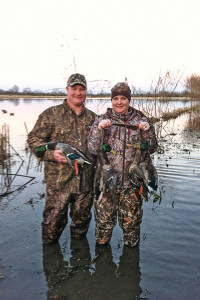 Again, she prefers blunt honesty: "Hevi-Metal, if you are an OK shot it's going to up your odds. Hevi-Steel is still just steel shot, you can put lipstick on a pig but it's still just a pig. With Hevi-Metal you will definitely know the difference. But Hevi-Steel shot is $10 a box cheaper than Hevi-Metal."
Again, she prefers blunt honesty: "Hevi-Metal, if you are an OK shot it's going to up your odds. Hevi-Steel is still just steel shot, you can put lipstick on a pig but it's still just a pig. With Hevi-Metal you will definitely know the difference. But Hevi-Steel shot is $10 a box cheaper than Hevi-Metal."
Just a year later, they tackled the lead shot market. For a non-toxic company known as Environ-Metal to start producing lead target loads was taking a big chance. The No. 1 thing people should do to improve their shooting is go start pulling the trigger more, Kelly says. "And I kept thinking about all the billions of shells shot at trap, but you can shoot two cases of shot in the blink of an eye. I agonized over it, but now we have lead dove, and upland and so on. It is selling extremely well."
Innovation. Their new Hog Wild loads (three huge round balls per shell) involved tons of blood, sweat and tears and "suddenly we have this great product at a price point. And there was a huge buckshot craze a few years back so we came out with a frangible version to avoid injury to unintended targets," she said.
Yet the wild success has not displaced a home-grown pride. Hevi-Shot is melted just 150 yards from Kelly's desk, and the company gave key employees part of the company so they are owners, too, and that creates a resounding pride. "It's really not a job. I take tremendous pride in what we do, it's not the money, it's seeing how much we've grown. We were the guppy in the ocean and now we're a big fish and it's so cool to be in on the ground floor of that," she says.
The Boss
CEO Ralph Nauman helped start the company in December of 1999 with shareholders who were retired duck hunters frustrated with the performance of steel. A metallurgist, Dr. Darryl Amick had invented a prototype of HEVI-Shot and "we decided to commercialize it with him," Nauman said.
Nauman is an MIT metallurgist who graduated in 1974 and worked for companies like BP, GE, and Thiokol, which made the Space Shuttle, and the ICBM program which Nauman ran. Remember the Peacekeeper ICBM missile program from the Reagan years? It's one of the reasons the Berlin walls came down and the Cold War ended.
"That was some weapons system let me tell you," Nauman said.
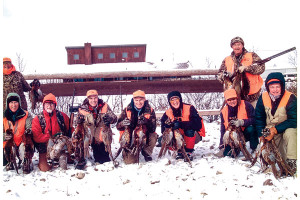 Ralph never hunted until his work with Hevi-Shot, but as a metallurgist/rocket scientist, ballistics was right up his ally. "I went pheasant hunting and just loved it, but I was a really bad shot and spent the next year shooting trap, clays and skeet," he says.
Ralph never hunted until his work with Hevi-Shot, but as a metallurgist/rocket scientist, ballistics was right up his ally. "I went pheasant hunting and just loved it, but I was a really bad shot and spent the next year shooting trap, clays and skeet," he says.
Now he chases upland birds and ducks (and regularly hits them), when he can get away. He's a hands-on CEO. In those early years, Ralph came into the shop at bizarre hours as they labored to make 100 pounds of Hevi-Shot in 24 hours. Mike Sorensen's company, Sorensen Inc., was hired to retrofit and design equipment for the plant in 2000 and Mike now runs it. Kelly started in 2001.
"Every day you learn a little, and you have setbacks but things get better all the time. It was kinda fun despite the bizarre hours. This whole company is like that. It's hard work and we get tired but we do have some fun," Ralph said.
Growing Pains
Always fun, but not always funny. A painful lesson defined their ethos of getting it right early on. Environ-Metal signed a deal to co-brand with Remington in 2001 (it ended in 2004), delivering the shot while Big Green made shells and marketed them.
"Just before we delivered our first load we got a call from a Cabela's employee who was drinking with a physics teacher," Ralph said. "He had tested the density of the shot using the Archimedes method (water displacement) and said that it was lighter than lead. We tested it using their method, too, and he was right. We couldn't ship any of it, and had to scrap 44,000 pounds and start over. Now we test density every 20 minutes. We will not ship it if it isn't right."
Spend much time talking to Ralph, and you can tell that he gets that it is about more than this week's bottom line. Employee ownership, safety, and flexibility, and creativity, are evident throughout his company, regardless of where the future leads.
"We will always make high quality, innovative stuff, in a safe plant," he says.
I Got An Idea
Talking to Mike Sorensen is like talking to a field hand who says "oh, by the way, yeah, I invented the tractor and combine." He quickly deflects that most of the ideas come when Kelly or someone says "This is what I'm hearing, this is what we need, or 'can you make something that will do this or that.' And of course there's cost constraints. The hog loads, for instance. Tungsten is expensive for going after a varmint that you don't care about," he says.
"So I think about what I want to shoot. Most of the time it's a little bit of from-the-hip speculation and hey, we just try it. Sometimes it's two or three times and you just keep modifying the results until you come up with something that works."
Speed Ball is a great example. "It's really neat, something to compete with Hevi-Shot at slightly better cost, and it is gaining traction. It seemed like people loved or hated it, it does kick harder, but it normally takes a few years for word to get out. It's great when you get those stories from hunters, 'you won't believe what we did this weekend.' That's really rewarding. And it helps that me and Kelly have a lot of off-work time to kick ideas around, so that's kind of fun. I'll wake up and she'll be like 'what are you thinking about?' And I'll say, 'I got an idea.'"
So where does Ralph, the rocket scientist CEO, see it all going? Much further than the company's origins, which started with a bunch of duck hunters tired of the short-fallings of steel shot. An ammo company, not a waterfowl shotshell niche company.
"Centerfire. We have a number of shotshell innovations in pipeline, it's a well that never runs dry. But centerfire is where it's going. It's obvious, yes, but it's hard to do. Lead is remarakable. It's dense and cheap and works really well. An affordable concept that beats lead is tough to create." 